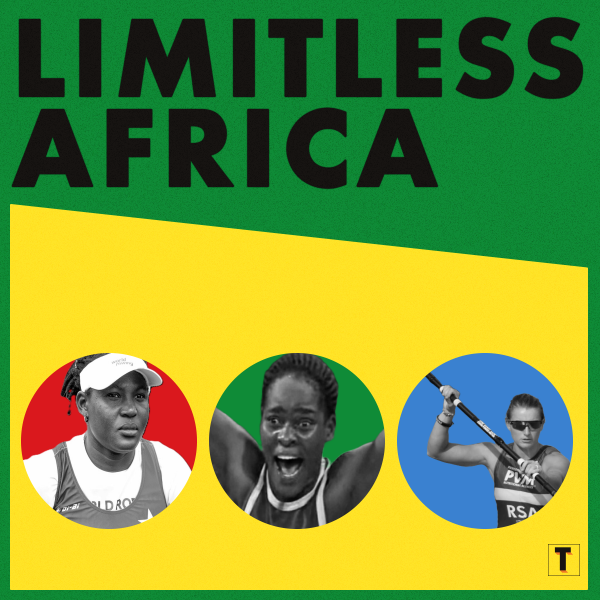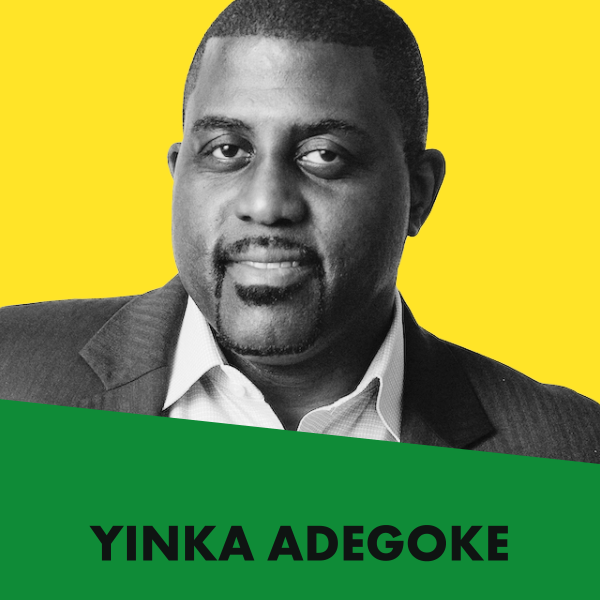How do you get more women in political leadership?
With guests Busisiwe Seabe, Noëlla Coursaris Musunka, Oby Ezekwesili

Episode notes
There are still very few African female heads of state.
Transcript
Africa is doing relatively well in getting women into political leadership. Rwanda, South Africa, Senegal and Ethiopia lead the world in terms of women members of parliament. But that’s not the story for the whole continent. And there are still very few female heads of state. Claude welcomes three guests:
Dr Oby Ezekwesili is a Harvard University graduate, former Education mini...
Africa is doing relatively well in getting women into political leadership. Rwanda, South Africa, Senegal and Ethiopia lead the world in terms of women members of parliament. But that’s not the story for the whole continent. And there are still very few female heads of state. Claude welcomes three guests:
Dr Oby Ezekwesili is a Harvard University graduate, former Education minister in the Nigerian government and ex-Vice President of the World Bank (African Region). She also started the movement #bringbackourgirls.
Busisiwe Seabe, one of the leaders of the Fees Must Fall student protests.
Noëlla Coursaris Musunka is a philanthropist, model, and founder and CEO of Malaika. The Malaika school provides free, accredited primary and secondary education to 400 girls in the south-eastern region of the Democratic Republic of Congo.
Transcript
How do you get more women in political leadership?
From TRUE Africa, I’m Claude Grunitzky, and this is Limitless. In this episode, we’re talking about women and politics.
“First of all, we have 54 countries in Africa. How many women presidents do we have? Seriously, not even five. It’s disgusting.”
“What they do is they pit women against each other.”
“Come on, girl, you’ve got everything that it takes to stamp your existence in the mind of the world.”
Claude: Welcome to Limitless, the podcast that asks the questions that matter for Africa. We’re looking for African solutions to African problems.
In each episode, we’re asking three guests one question that matters to Africans. And – no surprise – they don’t always agree.
The Limitless Podcast is supported by the U.S. Department of State and the Seenfire Foundation.
Africa is actually doing relatively well in getting women into political leadership positions. Rwanda, South Africa, Senegal and Ethiopia lead the world in terms of women members of parliament. But that’s not the story for the whole continent. And there are still very few female heads of state.
Dr Oby Ezekwesili knows what it takes to be a woman in power. She is a Harvard University graduate, former Education minister in the Nigerian government and ex-Vice President of the World Bank (African Region). I admire her for one thing in particular – she started the movement #bringbackourgirls after the Chibok kidnapping. Here’s our conversation.
I want to know how we can get more women in political leadership. Because the reason is, you know, you were a Minister of Solid Minerals in Nigeria, you were also a very important minister of education. So I think a lot of women can learn from you as they think of getting into political leadership.
Dr Oby Ezekwesili: So, one of the things about, you know, political leadership and all the things that go with, you know, people making it making personal progress as we would regard it. I mean, you read you reeled out the different frames that I have done, where with my life is that you might get caught up in the hoop race, of just living for yourself, but then what kind of life is that, right? I never, I never sort of sat down and, you know, sort of design a pathway of the jobs that I want to do in life. I actually just simply said, I have assignments that I must fulfil. I looked at every I looked at my life as a series of assignments, and he wants to do a job and any good livers. Well, not everybody can do assignments. So that sense of you know that sense of purpose about my being, that sense that I want to strive for more, I want to see I want to see more children of the poor realise their potentials. I want to see women who are less productive, become so productive that they can they can change communities. I want to say the girls look at themselves and say, there’s no real there’s nothing stopping me from attending leadership. Because, you know, leadership is gender neutral. There is nothing that handed leadership to the hands of the male child when he was coming into the world. There are barriers that are conditioned into the mind of society to perceive women as not being enough for leadership. But I want to look at the Young African woman and say to her, or even the woman anywhere, young woman anywhere in the world and say, Come on, girl, you’ve got everything that it takes to stamp your existence in the mind of the world. And the only way that I know is the way of service.
Claude: I hear you. What specific advice do you think you can give them given that many of them look at you as a role model given your height achievements?
Dr Oby Ezekwesili: So the advice is, at what level whatever level you are right now, don’t make it about yourself, serve, just serve.
Claude: I want to take it to the Bring Back Our Girls movement, which got a lot of press a few years ago. Did that help you to understand how to get people to listen, and even people like Michelle Obama, how did you go about getting people to listen to that when you know it was a pretty much an isolated movement in Nigeria before people started talking about it worldwide?
Dr Oby Ezekwesili: I think that by making the girls not just be another piece of news, people could relate to them. They when they heard the word, bring back our our girls. It wasn’t bringing back the girls it was our girls. Everyone immediately felt a sense of affinity. Empathy was easy to establish by making these girls that human beings that they are
Claude: Our next guest Busisiwe Seabe was one of the leaders of the Fees Must Fall student protests in 2015. She was 20 years old and attending Wits University in Johannesburg at the time. Fees Must Fall was a campaign to stop the increases in student fees. It grew into a huge political movement. She now works at the Gauteng Provincial Legislature in Johannesburg. I asked her how we can get more young African women into politics.
Busisiwe Seabe: That’s a very interesting question. And I think it’s a question that has come up a lot. And I think for me, it would be looking at framing or creating or nurturing young girls and women to become leaders of themselves more than leaders of society or other individuals. So it would be to teach young girls to stand up for themselves to speak up to express themselves. And as you know, the South African Miss Universe says to take up space, right doesn’t mean he says that you should take up space and this is not something that is taught. This is not something that is narrated in South Africa to a large extent. You know, as young girls, we are taught that our place is beside a man and it is to support a man. So I think our entire existence to a large extent is young, black woman in South Africa is to accommodate people it’s to accommodate patriarchy, it’s to accommodate sexism. It’s to accommodate capitalism it’s to accommodate exploitation. So I think for me, what becomes very important is to ensure first and foremost that all young black girls have access to education. And this is important in South Africa and Africa as a continent, because of the fact that our literacy rates are appalling. And I think that speaks a lot to not only access, but it also speaks to the content. Most of the time when we are you know, fortunate enough to access institutions of higher learning or to learn how to read and write. It is done from a positionality of trying to transform us into knowledge and we cling to an identity that is not ours. And it’s a very unfortunate thing because this is something that is taught from a very young age you see it when you look at the kind of toys that children play with the fact that we’re playing with, you know, Malibu Barbie with blond hair and blue eyes, as opposed to play with, you know, the zosi doll with an afro and brown eyes. It’s those little things that I think we need to start addressing. Politics is in everything that we do from the food that we eat. The clothes that we wear, everything is political, at the front, don’t take that seriously and frame the kind of politics we want young people to engage in. We’re going to be left with, you know, a politics that favours the west or a new liberal capitalist kind of agenda.
Claude: Do you think that South Africa is now doing a better job of making space for women in politics?
Busisiwe Seabe: What they do is they pit women against each other. And it becomes a survival of the fittest game amongst women in order to ascend to specific positions. And this is where things like the pull her down. syndrome come from. And this is where you see a lot of women saying they would rather lead a group of men than they would lead a group of women because we have been conditioned as women in South Africa to fight each other and to fight for minimal resources to fight for, you know, marginal spaces to fight for, you know, brand crimes, as opposed to directly going to challenge our male counterparts for what we know. We deserve and what what qualified for. I don’t think in South Africa, women are confident in the leadership of other women. And I think that this is more of a not only societal thing, but it is also an educational conditioning. And it is also based on experience. We haven’t experienced women in positions of power that have transformed you know, our societies, our communities.
Claude: Wonderful. This has been just so great. So eye opening for me. Thank you so much.
Our final guest is Noella Coursaris Musunka who is Congolese but was brought up in Europe where she worked as a model. She has another passion, which makes her one of the most powerful and practical change changemakers on the continent. It started at the age of 18, when she returned to Congo to meet her mother. There she witnessed first hand the poverty and lack of opportunity for women. In 2007 she set up Malaika, a school in rural Congo. It now educates over 400 girls. She explained how she keeps girls in education in a country where 7 million children don’t go to school.
What do you think should be done? And how can we get more women into political leadership in Africa and elsewhere?
Noella Coursaris Musunka: First of all, we have 54 countries in Africa. How many women president we have? Seriously, not even five. It’s disgusting. You know, I think the future is woman and the present and I think the future of Africa we need to have more women in power. And in very key roles.
We need to prepare them, educate them, teach them leadership skills. You give them leadership responsibility, inspire them to take ownership of their present, the future. And as I say Malaika is a leadership school our girls take part in girl scout, have their own government body.
Claude: How does Malayaka specifically encourage its students to take up leadership roles?
Noella Coursaris Musunka: The Malaika team on the ground is made up of Congolese men and women. We have number of women who are in leadership roles at Malaika and are extremely skilled and capable leaders. And adapt them selves and street smarts leaders, because in Africa, you need to be really street smart. A key to helping women take a leadership role is to train them well, to have women in leadership positions from the start, to create a culture that recognise the leadership of woman. Again, educating the communities is essential where there might be barriers to accepting women in leadership due to long standing cultural belief.
Our country manager, Sarah, she’s a woman, she’s speak French she speak English, she’s a real leader. So our students and our community can really look up to and a lot of them want to become like her.
You know, they was very tough at the beginning to find even a woman teacher.
Claude: Why was that?
Noella Coursaris Musunka: Because it was you have to imagine 15 years ago that woman a lot was being home and looking after the family. And similarly, it was something very innovative to be a teacher. And another point is they want to go to work where it’s very good and safe environment, and where there are toilets and sanitation.
Claude: Well, I noticed in some of the online video conversations that I participated in, that were organised around Malik because local leadership, a lot of these women are very, very strong. They have built up their resilience, you know, they can face any challenge, but I can see a critical path where they might be encouraged to get into local politics themselves because they want to enact change, perhaps on a bigger level. Is that something that you have encouraged or do you regularly just stay out of politics and focus only on education?
Noella Coursaris Musunka: No, we stay out of politics. We really focus on education. And on the career path. The first cohort of Malaika girls will be leaving Malaika – Oh, my gosh – end of next year, in one year, and so this is a big step for Malaika.
And we seen their aspiration. We already preparing them for what they want to do if they want to take vocational classes, or university, or if they want to work already in the community. And not a lot of them are interested in politisc, I think because they come from a very poor backgrounds, and I think they were disappointed. They know our school is free, but all the school in Congo you have to pay. So they felt in education, their government was not there. So they feel that as individuals they will be more able to do things and really push for a big change in the community, in the country.
But don’t get me wrong. politics, it’s important. They are the one that can really bring the change
Claude: We’re not looking for simple answers on this podcast. We believe Africa’s potential is limitless, and women are key to fulfilling it.
Women leaders in Africa are nothing new. Throughout our history, women have led armies, fought for independence, and brought about peace.
But there’s no denying that we need women (and men of course) to help build a fairer society.
Noella, Busisiwe and Oby are three very different leaders. But they do have one thing in common: they all know how to take up space.
Thanks for listening. To find out more, visit www.trueafrica.co/limitless or follow True Africa on Facebook and Twitter.
Tell us what you think using the hashtag #limitless africa
You’ve been listening to Limitless, I’m Claude Grunitzky. The Limitless Podcast is a production of TRUE Africa. This podcast is made possible with a grant from the U.S. Department of State and the Seenfire Foundation.
Listen next
"Nigeria is hot with fast girls" - The sprinters going for Olympic Gold
With guests: Favour Ofili, Olayinka Olajide, Rosemary Chukwuma, Tiana Eyakpobeyan
LISTEN NOW 17 min
Can sport change women's lives?
With guests: Akoko Komlanvi, Alcinda Helena Panguana, Esti Olivier
LISTEN NOW 15 min








